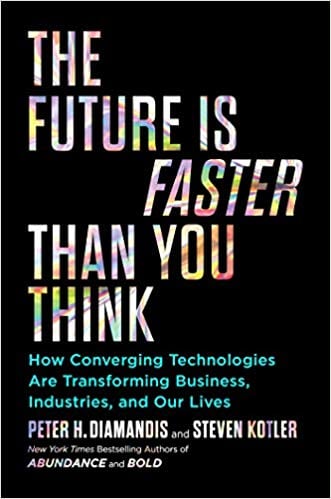You have /5 articles left.
Sign up for a free account or log in.
 The Future Is Faster Than You Think: How Converging Technologies Are Disrupting Business, Industries, and Our Lives by Peter H. Diamandis and Steven Kotler
The Future Is Faster Than You Think: How Converging Technologies Are Disrupting Business, Industries, and Our Lives by Peter H. Diamandis and Steven Kotler
Published in January 2020
This is going to be a critical book review.
I begin with this warning for two reasons.
First, I like this book.
I’m a raging techno-enthusiast, but a guilty one. Much of my brain is taking up with thoughts of advanced robots, self-driving electric cars and abundant solar-powered electricity.
More than being predisposed to think about and read books about exponentially advancing technologies, I’m also a fan of the writing of Diamandis and Kotler. The Future Is Faster Than You Think is the third installment of their technological convergence trilogy, the first two books being Abundance and Bold.
The second reason that I say up front that this will be a critical book review is that I want to engage the authors, and those who buy the book’s arguments, in a productive dialogue.
The challenge that I’ve found with those enamored by exponentially improving technologies, and who believe we are heading towards a Kurzweilian singularity, is that their ideas take on the enthusiasm of faith.
Anyone who questions the idea that we are on the cusp of a massive societywide shift is incapable of grokking the speed and impact of technological change.
So what I want to do is take Diamandis and Kotler’s ideas as hypotheses, rather than statements of fact, open to interrogation and possible disproval.
Where The Future Is Faster Than You Think excels, and what makes the book so enjoyable to read, is the infectious excitement that the authors bring to talking about new technologies. Reading this book makes one want to believe that the shift from gas-powered to electric cars will come sooner than we think. And that these soon to arrive vehicles will be self-driving.
The authors make a compelling case that robots are on the verge of taking over dangerous and repetitive jobs, and this change will not result in mass unemployment.
Due to the convergence of exponential technologies of sensors, networks, processing (quantum), AI, VR, robotics, batteries, manufacturing (additive) and materials, the next two decades will bring about a series of nonincremental advances in areas as diverse as transportation, education, health care and entertainment. At least that is the argument.
Here is where I want to challenge Diamandis and Kotler.
Let’s say that as a result of astounding advancing in technology, medical understanding and pharmaceuticals that the chances of dying from a specific disease dropped from over 90 percent to just over 10 percent. Further, say that this disease is the No. 1 killer, as compared to other illnesses, for a specific age group.
Doesn’t this story follow the convergence of exponential technologies narrative?
The trick here is that this is not a future projection, akin to the future developments described in The Future Is Faster Than You Think, but a story of the past 50 years. As recently as 1970, pediatric cancer killed 90 percent of all kids who received the diagnosis. Today, about 12 percent of kids who receive a diagnosis of cancer will not be alive after five years.
Kids' cancer is an extreme case of progress. But we see these sorts of medical advances in many places.
Did this convergence story result in a health-care system that we would describe as dramatically improved as compared to five decades ago? The depressing answer is no.
Health care is creeping up on accounting for 20 percent of our economy. Medical bills are ruinous to millions of Americans. Despite spending more money on medical care per capita than any other nation, the U.S. boasts some of the worst health outcomes of any wealthy country.
The problem with seeing the world through a lens of technological advancement is that the world is not built on discrete technologies. Our world is built on systems.
The health-care system is mind-bendingly complex. We can tell story after story of world-changing medical technologies, but few will be as amazing as the story of kids' cancer. This history should tell us something about what the next decades will look like.
The lesson of pediatric cancer should also tell us something about our system -- the postsecondary ecosystem.
We would be wise to be cautious about concluding that the development of any new technology will result in dramatic changes.
Increasing access while lowering costs and improving quality will require a systemwide approach.
The answers to improving higher education will be found more in the political and policy realms than in technology.
We can choose to provide adequate public funding to our public institutions, or we can choose to fund other things (such as prisons and medical care for the oldest old). This is a choice. We can raise taxes on the wealthy to invest in higher education, or we can choose to allow the wealthy to get wealthier.
Exponential technologies will not save higher education, any more than exponential improvements in treating certain diseases have saved the health-care system.
Stories about the impact of new technologies, divorced from discussions of policy, are best thought of as entertainment.
I was much entertained by The Future Is Faster Than You Think. I don’t believe that when it comes to the important things, however, that the book offers much in the way of insight into what life will be like in the future. But maybe I’m wrong. My critique of The Future Is Faster Than You Think is, after all, only a hypothesis.
What are you reading?




